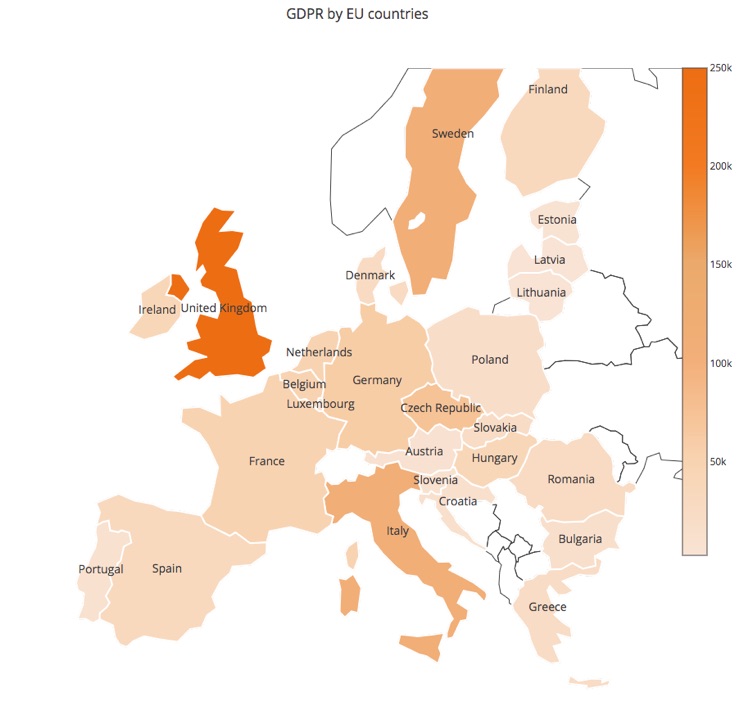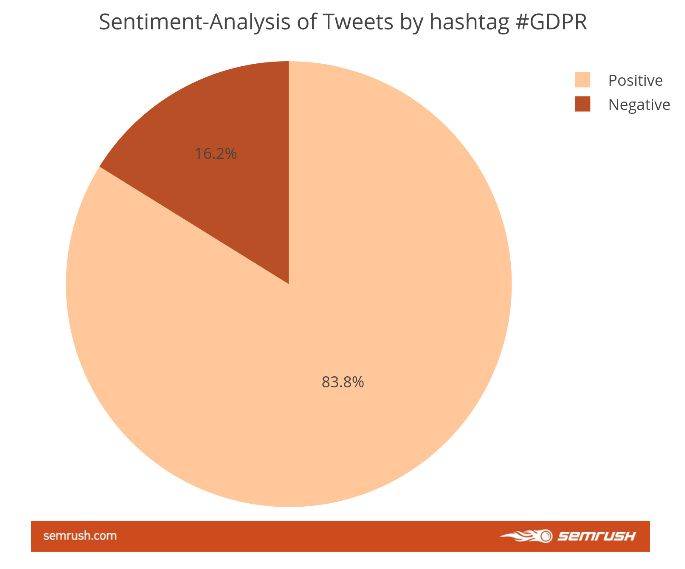GDPR became law on May 25, 2018. How did marketers react? How did the general public react? Here’s a round-up of surveys, polls and opinions about the GDPR opt-in opt-out preparations and the way ahead.
Last month saw a frantic scramble of email/text marketing messages zooming into inboxes across the UK and Europe, prior to GDPR becoming law on Friday, May 25th.
Some of the messages we received seemed genuine, some were jokey (perhaps a bit too chatty). Some were laudable and well thought-out, some laughable – even ludicrous. The Guardian gathered a few doing the satirical rounds on the web.
Various news channels carried interviews with members of the public who were, by and large, distainful about those sending the messages. “I just ignored them all” said one middle-aged gent. “It’s all a complete waste of my precious time” added a woman in her 40s. Will they soon wonder why their deals have dried up; their holiday enquiries halted; their travel alerts ceased?
Were news reports generally fair and balanced? Or did some just revert to the default picture – that of all marketers being spammers? Was the opt-in opt-out hokey-cokey just an easy opportunity to dust off the old junk mail jibes as the sun shone down on another Bank Holiday weekend?
However the topic was presented in the national and international press – and despite rumours that some large organisations have simply allocated budget as insurance against potential fines – the majority of industry players had been busy in the run-up to GDPR ‘D-Day’, ensuring compliance and also finding out what their customers want, going forward. Here’s what they were doing:

Sentiment analysis by SEMrush into tweets about GDPR globally showed that 83.8 per cent of people polled were positive in tone, with people wanting to find out more about it. Around the world, Google searches for GDPR increased from 250,000 to more than 2 million: UK internet users searched for GDPR 500,000 times in the last 12 months. The next two active countries were Italy and Sweden, with approximately 100,000 searches each. The Czech Republic and Germany came in fourth and fifth place, with approximately 50,000 internet users searching for information on GDPR.

Importance of GDPR opt-in opt-out
Meanwhile, research by GlobalWebIndex among 1,500 UK consumers found that the majority described GDPR as being extremely or very important to them in relation to their digital lives (76%). Just 2% thought it has no importance. Jason Mander, chief research officer at GlobalWebIndex, said: “Privacy concerns have long been widespread across the UK, but to date consumers haven’t always been sure how to manage their personal data effectively. One of the great things about the GDPR is that it now places this burden on companies rather than consumers, and it’s clear that customers from all age groups and all parts of the country have high expectations of what companies should be doing from May 25th onwards.”
And those expectations were immediately clear, as was quickly reported, with the first official complaints of non-compliance being filed against four big tech companies by European privacy pressure group noyb.eu (the newly-formed NOYB standing for None Of Your Business), against Facebook, Instagram, WhatsApp and Google’s Android operating system on the day the GDPR became law – citing ‘forced consent’ and ‘take it or leave it privacy’. The regulation authorities that will be involved in the cases will be France (Google Android), Belgium (Instagram), Hamburg (WhatsApp) and Austria (Facebook). The Irish Data Protection Commissioner is also likely to get involved as three of the companies’ headquarters are in Ireland.
Clearing out; cleaning up
Preparing for the GDPR and subsequent maintenance has cost companies of all sizes both time and money, in terms of systems, staff and training. That cost will have put some of the real spammers out of business – which is excellent news for the industry. Nonetheless, compliance has carried a high price tag for those organisations anxious to stay on the right side of the law; anxious to maintain trust with their customers; anxious to keep their heads above water in trying times. Consultancy UK calculated the cost of implementation at £15m for a FTSE100 company.
But it will have been worth it, says Karen Pritchard, director, Wilmington Millennium: “There has been much scaremongering from people who should know better about how GDPR was going to kill off the direct marketing industry. However, we’ve been through similar issues before and what happens is that the industry responds by cleaning up its act.
“This is merely another shake-out where we will see practitioners of disrepute disappear. This can only be a good thing.
“Already we’ve seen a marked difference following the ICO’s crackdown on telemarketing and GDPR will mean that, moving forwards, organisations will be forced to treat their customer data like the valuable asset it actually is.”
Carolyn Bondi, founding partner and data strategist at Thread said the new law would also spark ‘smarter marketing’. She said: “What’s interesting is that, over the past year, the onus has been on getting existing, legacy systems compliant. However, there is so much change in the market at the moment that few organisations have had an eye on how new technologies, platforms or software fit into the compliance puzzle and mostly the vendors and large consultancies have no interest in this.
“Consequently, we believe that there is a real opportunity to assist brands moving forwards with execution of new tech to power smarter marketing, but at the same time ensure that it sits within the limits of the new legislation.”
Industry players also had plenty to say on social media about the effects of GDPR – and some were scathing about how many companies were sending badly-written emails, seemingly lacking accurate information and advice on re-permissioning.
A week before the GDPR came into effect, Vibrant Media (@vibrantmedia) polled senior ad buyers and planners at agencies – including agenda21, OMD, Kingpin Communications, Mediacom, MEC, Mindshare, Neo @ Ogilvy, PHD International and Total Media. Some of the problems brands were reporting included low opt-in rates to email databases; slow uptake to review and set communications preferences; low traffic rates to websites so explicit consent could be attained; and a lack of confidence in the adequacy of GDPR compliance.
But Vibrant Media CEO, Doug Stevenson, was upbeat: “Agency execs are predicting that 43% of consumers will choose to opt out of an involuntary data relationship with brands, which presents a real opportunity to build trust with consumers so they opt-in to a more positive, transparent relationship.
“The reach of data reliant marketing campaigns will be greatly reduced after 25th May 2018. To maintain necessary scale, brands need to deploy marketing strategies that are keenly targeted to consumers but unreliant on data.”
His recommendation? He said: “Placing ads within contextually relevant editorial targets consumers by their interests, but without relying on consumer data such as cookies.”
The power of positive thinking, post-GDPR
But Will Anthes, MD of W8Data, was upbeat about the future of data marketing: “Six months ago, our research revealed that only a third of customer data complied with GDPR. However, with the flurry of re-permissioning campaigns we’ve seen over the past few months, we now believe that this is closer to two-thirds. This means that organisations have not lost the swathes of customers that many feared would be the case.
“In general, the consumer has welcomed GDPR and the majority are opting in to everything that they originally received. This is good news for marketers as it means that they can keep up the dialogue but in a managed and trusted way. The next few months will be about brands managing their customer data efficiently and ensuring that it is as clean and up-to-date as possible.”
This positive stance was echoed by Alchemetrics’ MD, Dave Gurney (@Alchemetrics), who said: “It’s an exciting world at the moment in terms of the plethora of data tech that is being introduced to the market. This means that data platforms are becoming increasingly powerful and 1:1 hyper personalisation is becoming the reality that has always been promised. GDPR sits at the heart of this and will act as the engine that will power which customers are contacted, at what times through what media with what messages.”
And Stu Broughton, Rubicon managing director, emphasised that compliance would be an ongoing commitment along the road ahead: “May 25th is just the beginning of the journey. GDPR compliance will be an evolution and organisations will find that data strategy will be more important than ever before in order to keep their business continually compliant.”
Finally, a poll by Databoxer got to the nub of what really riles the great British public and actually, it is a poor queuing etiquette that annoys us more than cold calling and we hate bad manners far more than marketing emails.
- 67% object to cold calls
- 66% of people hate strangers pushing into a queue without permission
- 63% get riled at the absence of manners
- 29% don’t like people sharing their photos on social media without checking it’s OK first
- 29% of people take umbrage when friends pop round unannounced
- 28% don’t want friends borrowing possessions without consent
- 28% don’t like unwanted marketing emails
So mind your manners, brands!
Tim Haynes, co-founder of Databoxer, said: “The advent of GDPR and brands having to take data privacy and consent more seriously is a timely reminder to us all about basic manners. If brands and marketers just acted with thought and common courtesy, they wouldn’t be having such a hard time dealing with these issues now.
“Simply remember, it’s polite to ask first and not take liberties with our data, our secrets or our stuff!”
Back to those comments by marketers on social media – they included this joke:
Q: Do you know a good GDPR consultant?
A: Yes, I do.
Q: Can you send me their email address?
Have an opinion on this article? Please join in the discussion: the GMA is a community of data driven marketers and YOUR opinion counts.







Leave your thoughts